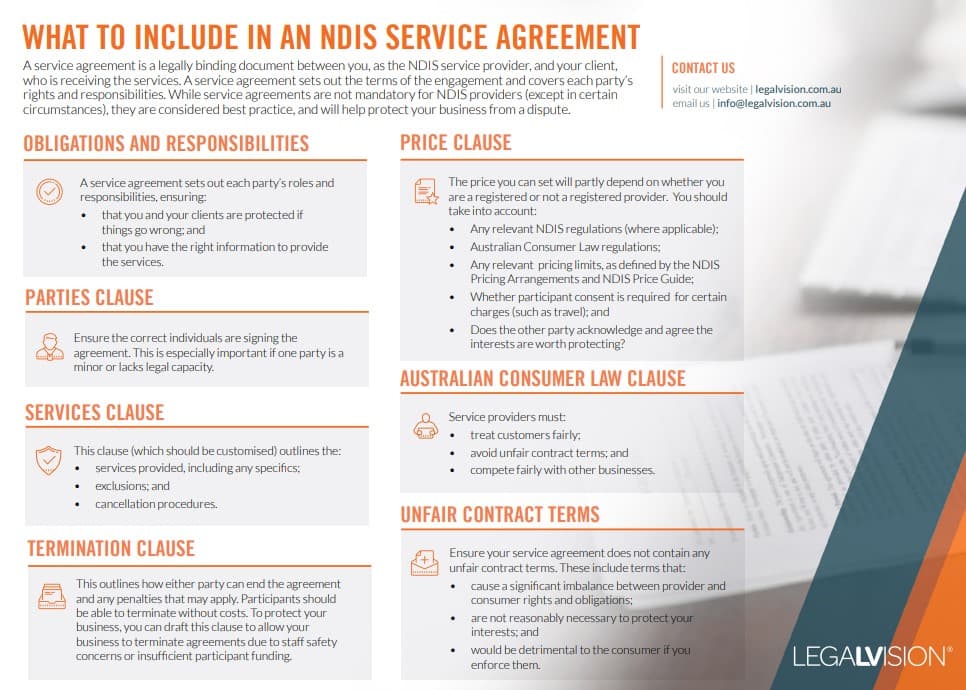In Short
- An NDIS service agreement is a contract between a service provider and a participant, detailing the supports to be delivered, their costs, and each party’s responsibilities.
- While not mandatory for all services, having a written agreement is recommended to ensure clarity and compliance with NDIS standards.
- Key elements include the scope of services, pricing, cancellation terms, and dispute resolution procedures.
Tips for Businesses
Establish clear, written service agreements with NDIS participants to define service expectations, pricing, and responsibilities. Ensure agreements are in plain language and tailored to individual needs to promote transparency and reduce misunderstandings. Regularly review and update these agreements to stay aligned with current NDIS guidelines and pricing structures.
As an NDIS provider, registered or unregistered – it is essential for you, as a provider and the participant receiving your services, to have a document outlining the important aspects of your relationship with the participant. This article will set out the role that service agreements play in the NDIS space and why all NDIS providers should have service agreements with all participants.
What is a Service Agreement?
A service agreement is a contract between an NDIS participant and you as the service provider that outlines the details of the support and services to be provided. This includes information such as:
- the specific supports and services you will deliver to the participant;
- the schedule and frequency of those supports and services;
- the cost of the supports and services and how they will be paid for;
- any cancellation fees or transport fees payable (in compliance with the NDIS Pricing Arrangements and Price Limits);
- the participant’s responsibilities in receiving the support and services;
- your responsibilities in delivering the support and services; and
- how can the services and agreement be changed or ended.
The service agreement ensures a clear understanding between you and the participant about what will be delivered, when, how, and at what cost. This helps provide certainty, transparency and accountability for you and the participant.
There are benefits to having a clear service agreement in writing between the provider and the participant. This is to ensure the parties are clear on the roles and responsibilities of each party and that the parties have the same expectations and understanding of the support provided and how it will be delivered. Having these expectations in writing and agreed upon helps avoid common disputes over services, fees, responsibilities, etc. In addition, the services must be provided under an acceptable agreement to claim GST-free status, and specific items under the NDIS may not be claimed unless it is set out in the service agreement (such as cancellation fees and transport costs).
Participants should have the right to negotiate their service agreement. If the participant does not have the capacity to do so, the participant’s parent, guardian or authorised representative may do so on their behalf.
Why are Service Agreements Important?
Service agreements serve several purposes in the NDIS context.
Clarity of Supports
The agreement should define exactly what supports and services you will deliver to the participant. This helps ensure the participant receives the care and assistance they require to meet their needs and goals.
Participant Empowerment
By outlining the participants’ rights and responsibilities, the service agreement empowers NDIS participants to be active and inform consumers of their support. Participants can ensure the agreement aligns with their preferences and have a mechanism to hold providers accountable.
Funding Certainty
The agreement specifies the cost of support and services and how payments will be made. This provides clarity around the utilisation of the participant’s NDIS funding allocation.
Continuity of Care
Service agreements help facilitate ongoing, consistent delivery of support. This is important for participants who require regular, long-term care to maintain their health and well-being.
Dispute Resolution
The agreement outlines a process for resolving disagreements or issues between the participant and provider. This helps mitigate disruptions to service delivery.
Regulatory Compliance
The service agreement can also clearly define each party’s legal and regulatory obligations under the NDIS. For providers, this can include things such as audit requirements, mandatory reporting, disclosure requirements and complaint procedures. In addition, certain line items can only be claimed if there is agreement from the participant, and the best way to do this is through the participant agreeing to the service agreement.
Protection for the Provider and the Participant
The agreement sets out the roles and responsibilities of each provider and the participant and offers protection for both parties if something goes wrong.
Continue reading this article below the formWhat Should I Include In My NDIS Service Agreement?
An effective NDIS service agreement should comprehensively outline the relationship between you as a provider and the participant while still remaining accessible and clear. Below is a general checklist of the elements you should include in your NDIS service agreement:
- all parties (the provider, participant, parents or guardians and authorised representatives) should be clearly identified and need to include the participant’s information (including their NDIS plan details) and emergency contact details;
- a detailed description of the supports and services provided, including specific support categories, service schedules and delivery methods;
- information on pricing, including a clear breakdown of the service fees, transport costs, any additional expenses that may be charged, and the participant’s plan management and funding arrangements (including how payments will be processed);
- the provider’s cancellation and rescheduling policies, including fees that may be payable, and the required notice periods for each party;
- the rights and responsibilities of each party, including communication methods, complaint procedures, incident reporting, and what happens in an emergency;
- the duration of the agreement – in other words, how long the provider will provide services;
- quality and safeguard commitments, including the provider’s compliance with the NDIS Code of Conduct and relevant regulations and avoiding conflicts of interest; and
- any additional specific provisions will depend on the services and support provided. This could include things such as behaviour support plans and medication management.

This fact sheet will help you to identify the key terms you must include in your NDIS service agreement.
Key Takeaways
Service agreements are important tools to outline the expectations of a provider and a participant when providing support and services under the NDIS. A clear and comprehensive service agreement with each participant is essential to delivering high-quality and compliant NDIS supports and services.
If you need help preparing a service agreement to cover NDIS services, our experienced NDIS lawyers can assist as part of our LegalVision membership. For a low monthly fee, you will have unlimited access to lawyers to answer your questions and draft and review your documents. Call us today on 1300 544 755 or visit our membership page.
Frequently Asked Questions
A service agreement defines roles, sets expectations, and prevents disputes between providers and participants. It clarifies services, costs, and payment terms while ensuring compliance with NDIS rules.
Written agreements empower participants, protect both parties and help providers meet legal obligations. They ensure transparency, maintain care continuity, and resolve disputes efficiently.
We appreciate your feedback – your submission has been successfully received.












